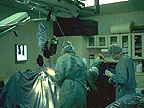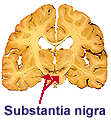 | New Hope for People with Parkinson's Disease |
 July 7, 2005
July 7, 2005Researchers in England have announced that they can partially reverse brain damage in people who have Parkinson's disease. A few years ago, five patients with Parkinson's disease had surgery to place a small tube into a brain area called the putamen. The tube was connected to a small pump implanted in the patients' abdomen. The pump delivered a drug called glial cell line-derived neurotrophic factor (GDNF). The researchers studied the brain of one of these patients who died of a heart attack.
This is the first evidence that treatment of GDNF into the putamen can cause the sprouting of new nerve axons that use dopamine and improve the symptoms of Parkinson's disease in people. However, the company (Amgen) that makes GDNF removed GDNF from the market because of safety concerns about the drug. Therefore, the other patients can no longer receive this treatment. Nevertheless, these new findings provide clues to how the disease progresses and as to what can be done to improve the symptoms and lives of people with Parkinson's disease. |
Parkinson's disease (PD) is a
neurological disorder that affects mainly those people who are 60 years
and older. Although there are drugs to control the symptoms of PD (such
as shaking arms and other movement problems), there is no known cause and
no cure for this disease. PD occurs when neurons degenerate (lose the ability to function normally) in a part of the brain called the substantia nigra. Many of these neurons connect to other neurons in the putamen. These degenerating neurons contain the neurotransmitter called dopamine. The loss of dopamine affects muscle control. Muscles may contract and relax, causing shaking called tremors. Or, if the muscles contract but do not relax, that part of the body can become rigid. |
| References and more
information about
Parkinson's disease, see:
|
| BACK TO: | Neuroscience in the News | Table of Contents |
![[email]](./gif/menue.gif) Send E-mail |
 Fill out survey |
 Get Newsletter |
 Search Pages |
 This male patient (62 years old) had been receiving a constant dose of
GDNF through the tube and pump for 43 months. Two years after the start
of the GDNF treatment, the patient's ability to move improved and the
capacity of his brain to use dopamine improved. When the patient's brain
was examined, the researchers found that the side that received
This male patient (62 years old) had been receiving a constant dose of
GDNF through the tube and pump for 43 months. Two years after the start
of the GDNF treatment, the patient's ability to move improved and the
capacity of his brain to use dopamine improved. When the patient's brain
was examined, the researchers found that the side that received  GDNF had more nerve fibers that used the neurotransmitter
dopamine than the side that did not receive GDNF.
GDNF had more nerve fibers that used the neurotransmitter
dopamine than the side that did not receive GDNF.